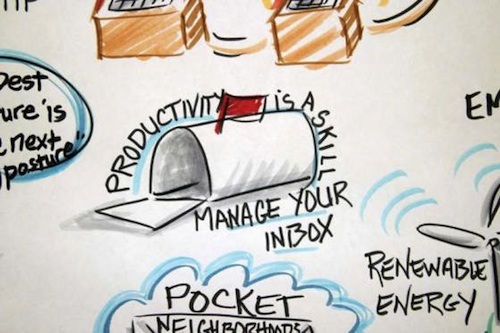Simple idea behind e-mail was to make our lives easier and more connected. It did that — you can fire off one line to a friend/business partner in Finland, and they can get it seconds later — but in the process, it also made things more complicated, created a whole new set of etiquette rules, and businesses just flooded the zone on it to the tune of 89 billion e-mails being sent per day. Inherent irony, then: designed to make life simpler, but actually made life more complex.
I’m going through a job search right now, so you’d think I’d be tethered to e-mail, doing the rapid response thing to any first-level opportunities that arise. Actually, no. That was my attitude a few months ago, but I found it was making me pretty negative — I’d get to the end of the day and realize I had checked e-mail 20 times and seen zero new leads. It felt frustrating. In the last two weeks, I changed my outlook and check e-mail once in the morning, then once at the end of the afternoon, and that’s it. It’s incredibly freeing in some ways, because you might see a bunch of generic rejections in there, but you also see a couple of new leads — so you end your afternoon thinking, “Oh, cool… contacts.” And you don’t spend all day wondering about the status of things.
Now, of course, there’s an easy rebuttal to the bigger point here: I don’t actually have an office job at present, so I’m not theoretically beholden to anyone in terms of paying my salary, hence I have the luxury described above. But could it be done — this 10 checks per M-F idea — in the modern work world? The short answer is no — that explains the 89 billion figure above — but the big answer could be yes. Think about this for a second: almost every major successful company in the world right now is more than 20 years old. That means they went from growth to maturity in a world without e-mail. There were memos and phone calls and face-to-face meetings, and those things were enough to help the company grow into a behemoth in its market. A person who’s currently 70 or so (i.e. my dad) spent basically 3/4 of their career without e-mail, and only the back 1/4 with it. So could you untether from e-mail except for two checks a day, and encourage people to simply call you or stop by your office with needs/concerns? You definitely could. I’m not arguing here whether it’s wise, but it can be done.
Here’s a post on this topic; scroll down to No. 8, as that’s the essential idea here. Basically, set aside chunks of time in your day to deal with e-mail. If you’re constantly responding to things as they arise, that’s the type of behavior that creates those threads where 490 responses come in with no call to action (this moves us towards the 89 billion figure). But if you’re checking once in the morning and once in the afternoon, and dedicating about 20-30 minutes to each experience, you can really put some context and heft behind the responses, and maybe stop an overloaded thread dead in its tracks.
Do you all think this could be done?
